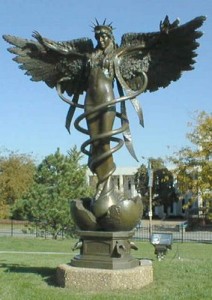Here’s the basic proposition of capitalism: If something can be done for a profit, it creates more value than the sum of its inputs.
But here’s the thing: This is an unproven assertion. In fact, in many cases, it is not true.
Worse, over the not-very-long run (a couple hundred years) it is almost certainly false.
You chop down the forests, you kill the animals, you loot and destroy entire cultures, you run your economy on planned obsolesence, and you pollute massively, causing runaway climate change (now effectively unstoppable) and ecosystem collapse.
All the value we have produced will be eaten up by this, and then some. If the carrying capacity of the Earth crashes anywhere between 50 to 80 percent (the current most likely scenario), then what we’ve accomplished is absolutely, almost unbelievably, a huge destruction of value, and nothing we have created is worth it.
Yet that is the current scenario.
It is isn’t all “capitalism,” of course. Communism couldn’t handle industrialization either. Democracy hasn’t handled it. Autocracy hasn’t handled. No one has handled it.
But this is the real situation, the odds that we will run into a collapse scenario are now very high. Because Sanders is the only candidate in the US with an adequate Green New Deal plan (Warren’s is not large enough), there’s only one chance to avoid worst case scenarios, because another four to eight years will put us even further behind. (In Britain, Corbyn is who you want if this is your priority. In Canada, no one is suggesting anything adequate, but Singh is the best candidate.)
Value isn’t just what you create. Value must also be measured by what you consume, what you pollute as a result of that consumption, and what you destroy.
Fools who go on about how this is the best time ever to be alive miss the point, even if they are right (this claim is dubious for billions of people). They are right in the same way as if, you sold everything you owned, then borrowed as much as possible, and then partied until you ran out of money, well, that may be the best time of your life…
Profit is not a proxy for adding value. The correlation is questionable, if it ever held any merit, and since the industrial revolution it has diverged more and more from being true.
We can’t afford “profit” as it is constituted today.
The results of the work I do, like this article, are free, but food isn’t, so if you value my work, please DONATE or SUBSCRIBE.


 Capitalism is based on the premise that profits reflect work that people want done, which is also worth more than the costs of its inputs.
Capitalism is based on the premise that profits reflect work that people want done, which is also worth more than the costs of its inputs.